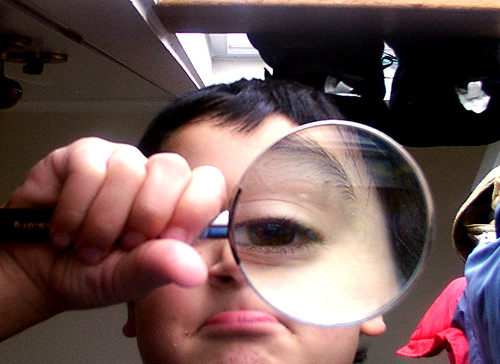We run our website the way we wished the whole internet worked: we provide high quality original content with no ads. We are funded solely by your direct support. Please consider supporting this project.

Rethinking Our View of Faith
The second conviction of the “ReKnew Manifesto” is that we need to rethink what it means to have faith. It’s my impression that many, if not most, Evangelical Christians associate their assurance that they’re “saved” with their confidence that they believe correct doctrines. This is why many, if not most, think that heretics who believe wrong doctrines are lost. This way of feeling assured is also related to the widespread assumption that a person’s faith is as strong as the person is certain — hence, free of doubt — regarding their beliefs.
We believe its time to reexamine what it means to have faith.
In my previous post I argued that many Christian’s model of faith is closer to magic than the biblical understanding of faith. In the book I’m working on (presently entitled, Benefit of the Doubt) I have four chapters of other arguments against this model. In this and my next post I’ll briefly outline eight of these arguments, covering four in each post.
So here we go….
* The model of faith that encourages people to shun doubt and strive for certainty makes a virtue out of a non-virtuous behavior.
Why would God leverage a person’s salvation — and in some forms of Christianity, other “blessings” such as getting healed as well — on the degree to which people can convince themselves of something? What is virtuous about this ability? The capacity of a person to engage in this behavior has nothing to do with their character.
The truth is, the more rational and sober-minded a person is, the worse they will be at doing this. But the more simple or delusional a person is, the better they will be at doing this. And either way, character doesn’t factor into the equation. So why would God make faith the centerpiece of his relationship with us, if this is what faith is all about?
* The certainty-seeking, doubt-shunning model of faith reduces faith to mental gimmickry.
As I flesh it out in Benefit of the Doubt, the biblical model of faith is all about character. It’s a beautiful covenantal concept that concerns our trust in another and our trustworthiness in relationship with another. This kind of faith isn’t concerned with becoming psychologically certain of anything. To the contrary, this kind of faith addresses our character precisely because it’s about our willingness to commit to a course of action in the face of uncertainty. The certainty-seeking model of faith reduces this beautiful covenantal concept down to a mental gimmick, for the fact of the matter is that being able to push doubt aside and become certain of something by an act of will is a mental trick that some people can play on themselves while others cannot.
* The certainty-seeking model of faith is irrational.
The rational way to form beliefs is to base our level of confidence in a belief on the strength of evidence and/or arguments for or against it. The stronger the evidence and/or arguments are for a belief, the greater our confidence that the belief is true. Trying, by an act of will, to bump our confidence beyond what evidence warrants is simply irrational. Yet, to the thinking of many Christians, people’s eternal fate depends on their ability to do just this!
* The doubt-shunning model of faith is not concerned with truth.
Suppose I’m purchasing a car, about which the dealer makes many great claims to justify the exorbitant price he’s asking for it. Before I lay down my hard-earned cash, I will want to thoroughly check out this car to determine if the dealer’s claims are true. (Actually, I’d hire someone else to do this since I know nothing about cars.) This is what we must do whenever we are concerned with determining whether or not a truth claim is actually true.
In this light, what are we to make of the model of faith that encourages believers to shun doubt and strive to be as certain as possible that the things they already believe are true? The unavoidable answer is that they simply cannot be concerned with the truthfulness of their beliefs. The fact of the matter is that one cannot be concerned with believing the truth if they’re at the same time trying to convince themselves that what they already believe is true. One has to be willing to doubt what they presently believe is true if they are going to be concerned with the truthfulness of what they believe.
I am not questioning the sincerity of those who embrace this model of faith when they claim to believe the truth. But with all due respect, I can’t see how to avoid the conclusion that they are sincerely deluding themselves.
Think about it. In my next post I’ll offer up four other even more serious arguments against the faith-seeking, doubt-shunning model of faith.
Until then, I encourage you to trust the character of the God revealed in Christ and to live in a trustworthy relationship with this God. But please, please don’t get sucked into thinking you’re ever supposed to suppress doubt and convince yourself of anything!
Image by chrisbrenschmidt. Used in accordance with Creative Commons. Sourced via Flickr.
Related Reading

Lighten Up: Believing in Believing
OK, we don’t really think this is the difference between theology and philosophy, but how does this guy not get that not believing in believing is, itself, a belief?

Is Suffering Part of God’s Secret Plan?
In the Christian tradition since Augustine, the most common explanation for the apparent arbitrariness of life and God’s interaction with humanity has been God’s mysterious will—his “secret plan,” as Calvin says. Whether or not a child is born healthy or a wife is killed by an intruder is ultimately decided by God. If we ask…

Happy Birthday to Us
A♥ via Compfight It’s hard to believe, but it was on this day (June 30) one year ago that we launched the ReKnew website. Happy Birthday ReKnew!! As reflected in the ReKnew Manifesto, our goal is to stimulate Christians to rethink foundational aspects of the faith they embrace and to motivate skeptics to take a…

Welcome to ReKnew!
Thanks for visiting ReKnew.org! We’re delighted you came to check us out!
I and the team of people who helped launch this ministry are incredibly excited about the vision God has given us for ReKnew. We believe God has huge plans in store not only for this website, but for this ministry as a whole. It’s our hope and prayer that you will be impacted by this ministry and inspired to join us as we seek to advance the beautiful, peculiar, Jesus-looking kingdom of God.
Let me introduce you to ReKnew by sharing with you why we exist.

Court-of-Law Theology: How It Falls Short
Courtney “Coco” Mault via Compfight Last week, we introduced a way of talking about theology with concentric circles. This approach is distinct from the common Western model of theology that depends upon a court-of-law framework. The following is an excerpt from Greg’s book Benefit of the Doubt regarding this: ____________________________ Within the legal strand of…

Faith, Doubt and Agnosticism
Hartwig HKD via Compfight Greg was recently interviewed by Premier Radio in the UK for the program Unbelievable? along with Andrew Whyte (an agnostic) on the topic of faith and doubt. They discuss their personal journeys of doubt and how this led them on vastly different paths. You can find the interview by clicking here. You…
